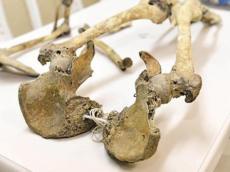|
|
TODAY.AZ / Weird / Interesting
Bones unearthed in Marmaray excavations shed light to life of ancient people
07 January 2014 [10:13] - TODAY.AZ
 Ancient bones and skulls unearthed during the Marmaray excavations in Istanbul have been examined and significant clues about the physical structures, eating habits and social life of people living in ancient times have been obtained.
Ancient bones and skulls unearthed during the Marmaray excavations in Istanbul have been examined and significant clues about the physical structures, eating habits and social life of people living in ancient times have been obtained.Speaking about the issue, Y?ld?z Technical University Istanbul Historic Peninsula Application and Research Center (ISTYAM) Biological Material Research Commission President Mehmet Görgülü said that they focused on the millennia old skeletons unearthed in their observations.
“Identification [of the bones] reveals the age, height, and sex of the people who lived in that period. We can also make evaluations about these people’s diseases, diet methods as well as their work and lifestyles. The genetic identification process gives us sample from their DNA and we can reveal their genetic journey. If they had a genetic problem, we have the chance to reveal this diseases. Our country has these technologies. This year we will also find opportunity to publish the data we have obtained,” Görgülü said.
Nutritional style
He added that they had discovered that people living in Yenikap? had a good nutritional style. “We call these people the ‘Yenikap? society.’ They are people of harbors. Examinations on the skeletons that have been unearthed during excavations in various parts of Anatolia have revealed that they had serious problems of food. The Yenikap? society did not have problem of food. Their wisdom teeth are flawless. Today, the wisdom teeth are a real problem, too. But when we examined the jawbones found in the excavations, we saw that their teeth were very healthy. This shows us their proper eating styles. Our jaws have been shrinking because of changing eating styles through time and this is a problem for wisdom teeth; they can’t find a place in the mouth. I don’t know when but these wisdom teeth will have vanished one day,” he said.
Görgülü also said they had observed children’s skeletons and drawn some conclusions, noting that the belief that old people were much bigger than today had been disproved.
“We determined during our examinations on skeletons that these people were medium-sized. Women were about 1.58-1.59 and men were about 1.60-1.68 in height. We also found that children were dying in that time because there were too many children skeletons. Medical conditions, inflectional diseases, natural disasters and environmental factors caused the increase in the number of child deaths ... We were able to obtain DNA from the bones. The mother ancestry of these people came from Asia Minor and Mesopotamia, but we cannot say anything about their father ancestry,” he said.
Görgülü also added that the National Geographic had been carrying out a project named “Genographic,” and they were now carrying out the Anatolian leg of the project.
/HurriyetDailynews/
URL: http://www.today.az/news/interesting/129694.html
 Print version
Print version
Views: 1824
Connect with us. Get latest news and updates.
See Also
- 05 February 2025 [19:41]
Japan plans to negotiate with Trump to increase LNG imports from United States - 23 January 2025 [23:20]
Dubai once again named cleanest city in the world - 06 December 2024 [22:20]
Are scented candles harmful to health? - 23 November 2024 [14:11]
Magnitude 4.5 earthquake hits Azerbaijan's Lachin - 20 November 2024 [23:30]
Launch vehicle with prototype of Starship made its sixth test flight - 27 October 2024 [09:00]
Fuel prices expected to rise in Sweden - 24 October 2024 [19:14]
Turkiye strikes terror targets in Iraq and Syria - 23 October 2024 [23:46]
Kazakhstan supplied almost entire volume of oil planned for 2024 to Germany in 9 months - 23 October 2024 [22:17]
Taiwan reported passage of Chinese Navy aircraft carrier near island - 23 October 2024 [21:50]
Russia remains largest oil supplier to India
Most Popular
 Step by step, Pashinyan forces to fulfill Baku's conditions
Step by step, Pashinyan forces to fulfill Baku's conditions
 Destroyed cemeteries in Karabakh: Armenians have raised a question that incriminates them
Destroyed cemeteries in Karabakh: Armenians have raised a question that incriminates them
 Kazakhstan's report confirmed Baku's correctness. What will Moscow say now?
Kazakhstan's report confirmed Baku's correctness. What will Moscow say now?
 Azerbaijan advances solar power plant construction with UAE’s Masdar and SOCAR Green
Azerbaijan advances solar power plant construction with UAE’s Masdar and SOCAR Green
 Russian propagandists work hard on lies about the AZAL disaster
Russian propagandists work hard on lies about the AZAL disaster
 Armenian PM agrees not to deploy EU troops on border with Azerbaijan
Armenian PM agrees not to deploy EU troops on border with Azerbaijan
 OTS and Turkish Investment Fund discuss boosting economic cooperation
OTS and Turkish Investment Fund discuss boosting economic cooperation
